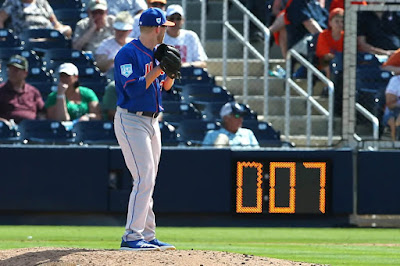The only thing that is inevitable in life and sports is change. While conservative (read old school, traditionalist) fans lament anything not like the last. There is room for improvement in the game in any sport. But baseball has traditionally been the slowest to move. With Commissioner Rob Manfred, that has been accelerated with a hyper focus on reducing game length. Whether shorter games are a desire for fans is in the eye of the beholder. While 2023 seems like an anomaly in terms of drastic rule changes we've had a number in recent years and this really is just the latest wave.
The lates includes universal DH starting in 2022, COVID introduced but Commissioner kept extra inning ghost runners to speed up the game (and reduce pitcher wear), three batter minimum for relievers (to reduce game time), and limited mound visits introduced in the last 5 years. In years past, we've lowered the mound (and standardized), allowed instant replay reviews changes of the play (various states of what's reviewable and how it's initiated to include umpire explanations now), changed interference rules for double players, changed blocking home plate rules, implemented pitcher inspections for grip, changed rules for what players could do for watching in game replays, a lot of things.
 |
| Baseball Commissioner Rob Manfred has made decisions and many fans aren't happy |
But it seems like this year's changes seem to cut at more of the fundamentals of baseball. Baseball is not supposed to have a clock. The bases have been the same size for a century. Defenses being able to position where they want is strategy. Pitchers throwing to a base when desired is just part of it. Let's break down the impact of the new rules. It may not be what you think. Here is from most impactful to least impactful:
1) Limited throws to first base
- Pitchers are limited to two disengagements (pickoff attempts or step-offs) per plate appearance. However, this limit is reset if a runner or runners advance during the plate appearance.
- If a third pickoff attempt is made, the runner automatically advances one base if the pickoff attempt is not successful.
- The bases, which traditionally have been 15 inches square, will instead be 18 inches square. Home plate is unchanged.
- The bases, which traditionally have been 15 inches square, will instead be 18 inches square. Home plate is unchanged.
- The four infielders must be within the outer boundary of the infield when the pitcher is on the rubber.
- Infielders may not switch sides. In other words, a team cannot reposition its best defender on the side of the infield the batter is more likely to hit the ball
 |
| Student Body Right is no longer allowed |
- The pitcher must begin his motion to deliver the pitch before the expiration of the pitch timer.
- Pitchers who violate the timer are charged with an automatic ball. Batters who violate the timer are charged with an automatic strike.
- Batters must be in the box and alert to the pitcher by the 8-second mark or else be charged with an automatic strike.
 |
| Large counting down digits are here to stay in baseball |



